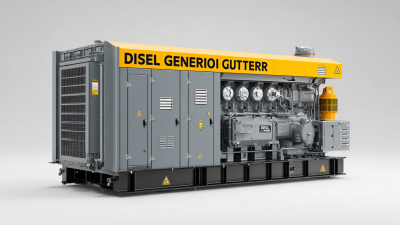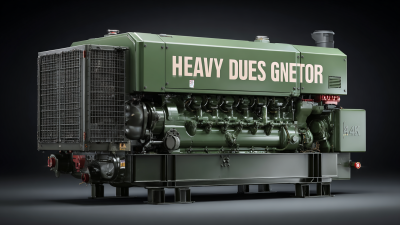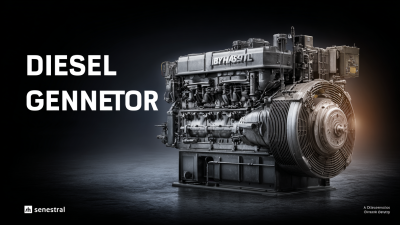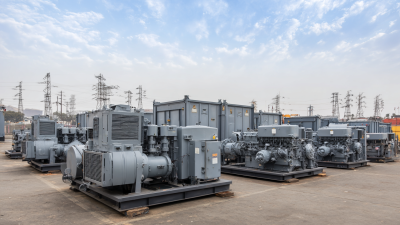
-
Home
-
Products
-
Service
-
About Us
-
Solution
-
Videos
-
News
-
Contact Us
Leave Your Message

In recent years, the quest for more sustainable power solutions has prompted a critical evaluation of conventional energy sources, particularly in the context of backup and portable power systems. The reliance on Generator 20kw Diesel, which has traditionally been favored for its reliability and power output, is increasingly being scrutinized due to its environmental impact and rising fuel costs. According to a report by the International Energy Agency (IEA), the shift towards renewable energy sources is not just a trend but a necessity, with global investments in renewables expected to reach $3 trillion by 2025. Furthermore, the diesel generator market is projected to decline as more companies and individuals seek cleaner alternatives that align with sustainable development goals. This blog explores efficient alternatives to diesel generators, highlighting the importance of technological advancements and innovative solutions that not only meet power demands but also promote environmental stewardship and energy resilience.

As the world increasingly seeks sustainable energy solutions, innovative solar power systems are emerging as effective alternatives to traditional diesel generators. Recent studies indicate that the solar energy market is projected to grow substantially, with the International Energy Agency estimating that solar capacity could increase by over 600 GW by 2025. This shift not only aims to reduce carbon emissions but also aligns with global efforts to transition toward cleaner energy sources.

Solar power systems present numerous advantages over diesel generators. For instance, a 2022 report from the Global Solar Council highlights that the levelized cost of electricity from solar PV has dropped by 89% since 2010, making it an economically attractive option. Additionally, solar installations require less maintenance than diesel systems and have no fuel costs, further enhancing their appeal for businesses and households alike.
As technology advances, improved solar storage solutions are enabling more reliable power supply, appealing to users who previously relied on fossil fuel generators. The potential for solar energy to create a sustainable energy future is significant, proving that innovative technologies can indeed replace outdated systems for long-term benefits.
Wind energy has emerged as a vital component in the quest for sustainable power solutions, particularly for small-scale applications. By harnessing the natural power of wind, users can significantly reduce reliance on diesel generators, which not only contributes to lower emissions but also decreases operational costs. For businesses or homes looking to transition to a cleaner energy source, small wind turbines offer an efficient alternative, capable of generating sufficient power to meet everyday needs.
**Tip:** When considering wind energy for your small-scale applications, assess the average wind speed in your location. The effectiveness of a wind turbine largely depends on the consistent availability of wind, so ensuring your site has adequate resources is key to maximizing energy production.
In addition to cost savings, integrating wind energy systems can enhance energy independence. By producing your own energy, you are less vulnerable to fluctuating fuel prices and can enjoy greater control over your energy consumption. This independence is particularly beneficial for rural areas or locations where access to traditional power grids is limited.
**Tip:** Always check local regulations and incentives for wind energy installation, as many regions offer tax breaks or grants that can make the initial investment more manageable.

Battery storage solutions have emerged as a vital component in addressing the reliability concerns associated with off-grid energy needs. With the increasing demand for clean and sustainable energy, traditional diesel generators are being replaced by innovative battery systems that allow for efficient energy storage and usage. These systems can store excess energy generated from renewable sources such as solar and wind, providing a steady power supply even when generation is low. This capability not only enhances reliability but also significantly reduces carbon emissions, making them an environmentally friendly alternative.
Moreover, advancements in battery technology have led to the development of high-capacity, long-lasting storage units that can meet the diverse energy demands of both residential and commercial setups. Technologies such as lithium-ion and flow batteries are paving the way for more responsive and durable storage solutions, capable of managing peak loads and ensuring energy availability throughout the day and night. With the right battery storage solution, off-grid users can enjoy the freedom of energy independence without compromising on reliability or sustainability, ushering in a new era of energy management that aligns with our ecological goals.
Hydrokinetic energy presents a groundbreaking solution in the pursuit of sustainable power. Unlike traditional methods of generating energy, this innovative approach harnesses the natural flow of water, transforming kinetic energy from rivers, tides, and ocean currents into clean electricity. As the global demand for energy continues to rise, tapping into the boundless potential of hydrokinetic resources could provide an efficient and environmentally friendly alternative to diesel-powered generators.
The technology behind hydrokinetic energy conversion is rapidly evolving, with advancements in turbine design and underwater energy generation systems. This enables a more adaptable and less intrusive installation process, making it possible to deploy hydrokinetic turbines in diverse aquatic environments. Moreover, leveraging water flow for power generation not only reduces carbon emissions but also minimizes the ecological impact often associated with conventional power sources. By embracing hydrokinetic energy, communities can benefit from a sustainable, renewable energy source that contributes to a cleaner and greener future.
| Aspect | Diesel Generator 20kw | Hydrokinetic Energy | Advantages | Challenges |
|---|---|---|---|---|
| Fuel Type | Diesel | Water Flow | N/A | Depends on water availability |
| Emissions | High | Zero during operation | Environmentally friendly | Potential impact on aquatic ecosystems |
| Operational Cost | High due to fuel | Low, minimal ongoing expenses | Lower long-term costs | Initial investment may be high |
| Maintenance Requirements | Regular maintenance, fuel supply | Periodic checks | Less frequent maintenance | Technology still developing |
| Power Output Consistency | Consistent under load | Variable, dependent on flow | Potentially renewable source | Requires specific site conditions |
As the quest for sustainable energy solutions intensifies, biomass and biofuels stand out as promising alternatives to traditional diesel generators like the 20kw diesel unit. Lignocellulosic biomass, derived from agricultural waste, is gaining attention as a valuable feedstock for second-generation biofuels. This transformation of agricultural byproducts—from environmental burdens to energy resources—reflects a significant shift towards utilizing abundant local materials. By converting these resources into biofuels, we not only enhance energy security but also contribute to a circular economy.
Moreover, the innovative use of algal biomass in biofuel production further expands the range of sustainable energy solutions. Microalgae, with their rapid growth rates and ability to thrive in diverse conditions, offer a viable pathway for producing biodiesel, hydrogen, and other biofuels. Recent advancements in biofuel production technologies underscore the importance of microalgae as a clean and efficient energy source, reinforcing the role of biofuels in achieving carbon neutrality. As the global energy landscape evolves, these renewable alternatives are pivotal in driving the transition towards a greener economy.





